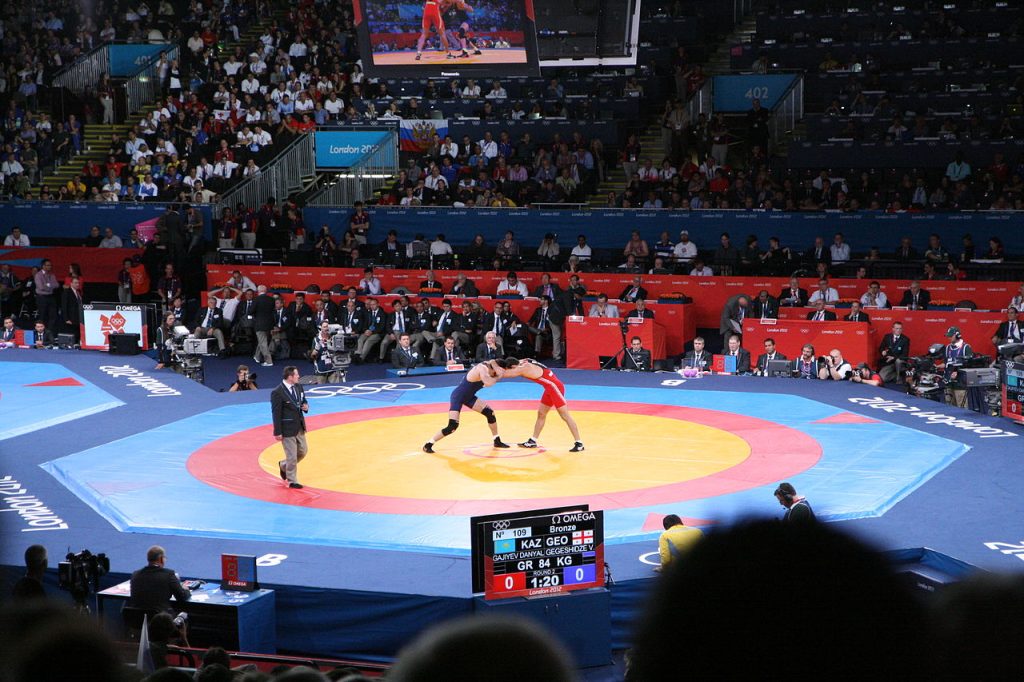Wrestling stands as one of the oldest and most traditional sports in the Olympic Games, tracing its origins back to the ancient competitions held in Greece. As a testament to physical strength, tactical skill, and sheer will, wrestling has not only endured through centuries but also evolved to remain relevant in the modern Olympic movement. This sport challenges athletes to demonstrate their prowess in one-on-one combat, making it a compelling spectacle and a crucial part of the Olympic program. As with many Olympic sports, it attracts attention not just from sports enthusiasts but also from those interested in Olympic betting.
1. Historical Background
The history of wrestling in the Olympics begins with its inception during the ancient Olympic Games in Greece, where it was introduced as early as 708 BC. Initially part of ancient military training, wrestling was designed to develop the strength, speed, and tactics necessary for hand-to-hand combat. The sport was held in high esteem in ancient times, often serving as the decisive final event of the Pentathlon, thus determining the ultimate victor of the games.
As the Olympics evolved, wrestling maintained a central role. It was one of the nine sports featured in the first modern Olympic Games in 1896 in Athens, reflecting its historical significance and universal appeal. Wrestling has been included in every modern Olympics since, with the sole exception of the 1900 Paris Games. Olympic inclusion not only provided wrestling with a larger platform but also encouraged further standardization and refinement of rules and practices
2. Modern Olympic Wrestling
Modern Olympic wrestling has been shaped by its historical past but adapted to suit contemporary standards and audiences. The sport is currently divided into two main styles: Greco-Roman, which restricts holds to the upper body and prohibits techniques below the waist; and freestyle, which allows athletes to use their legs for holds and attacks, offering a more dynamic and varied competition style.
The inclusion of wrestling in the Olympics faced a significant challenge in 2013, when the International Olympic Committee (IOC) proposed its removal from the list of core sports. This decision was met with substantial backlash from the wrestling community and its supporters worldwide, leading to a vigorous campaign to reinstate wrestling. Successful lobbying, coupled with reforms aimed at modernizing the sport, led to its reinstatement later that year, securing its place in the 2020 Tokyo Olympics and beyond.
3. Rules and Format
Wrestling at the Olympics follows specific rules that govern scoring and competition structure. Points are awarded for various techniques and control, including takedowns, reversals, and exposures (turning an opponent’s back towards the mat). The complexity of scoring reflects the strategic depth of the sport, as wrestlers must balance aggression with tactical defense.
Competitions are divided into weight classes, ensuring fairness and equity among competitors. Each Olympic wrestling event typically follows a bracket-style, single-elimination format with wrestlers competing in a series of rounds culminating in a gold medal match. Losers of the semifinals face off in a bronze medal match, and in some weight classes, repechages are used, allowing competitors who lose to a finalist a chance to compete for bronze.
4. Recent Developments
Following the near-exclusion of wrestling from the Olympic program, significant changes were implemented to address the criticisms that had led to the IOC’s initial decision. These included modifications to make matches shorter and more dynamic, revisions to the scoring system to enhance clarity and excitement, and adjustments to weight classes to promote greater gender equality in the sport.
The changes were successful not only in preserving wrestling’s place in the Olympics but also in enhancing its appeal to a broader audience. The sport was not only featured in the Tokyo 2020 Olympics but also confirmed for the Paris 2024 Games and is on the provisional list for the Los Angeles 2028 Olympics, reflecting its restored status and importance.
5. Future of Wrestling in the Olympics
Looking ahead, the future of wrestling in the Olympic Games appears stable yet poised for further evolution. The sport’s governance, under bodies such as United World Wrestling (UWW), continues to focus on promoting wrestling globally and enhancing its appeal through innovative approaches to competition and presentation. Discussions about potential reforms are ongoing and include ideas such as incorporating more engaging competition formats and further promoting women’s wrestling to ensure parity and expand its reach.
As the Olympic landscape continues to evolve, wrestling must maintain its relevance by adapting to changing tastes and expectations while preserving the core elements that have made it a cornerstone of the Olympic tradition for millennia. The challenge lies in balancing tradition with innovation, ensuring that wrestling remains as captivating to future generations as it has been to those in the past.
Wrestling’s journey through Olympic history is a reflection of its resilience and its capacity to engage and inspire, embodying the Olympic spirit of competition and excellence. As long as these values remain at the heart of the sport, wrestling will likely continue to hold its place as an essential and vibrant part of the Olympic Games.
